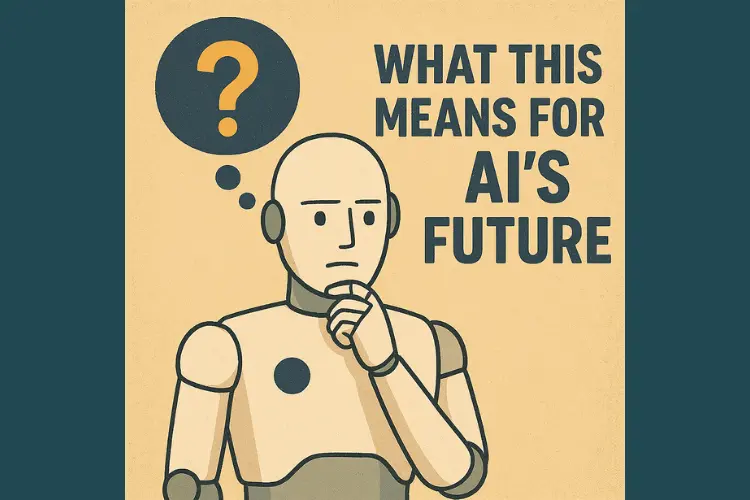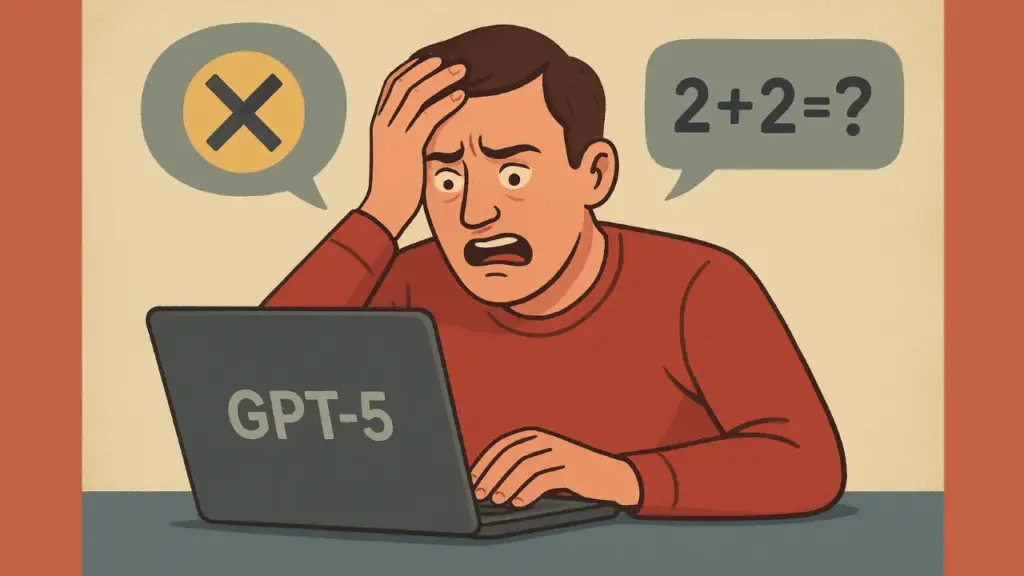Introduction
Artificial Intelligence is evolving rapidly, but not always in ways users expect. OpenAI’s GPT-5 launched with bold claims of advanced intelligence and deeper reasoning. Many believed it would outperform GPT-4 and redefine AI standards. Instead, it has sparked frustration.
Reports of GPT-5 failing at basic math shocked the community. Forums filled with criticism, and users began calling for the return of older models. This blog explores why GPT-5 is facing backlash, what went wrong, and how it could impact the future of AI.
The Rise of GPT-5
OpenAI positioned GPT-5 as a smarter and more capable upgrade. Marketing highlighted its reasoning skills, faster responses, and ability to handle complex tasks. The model was even promoted as having near PhD-level intelligence.
Businesses were eager to explore its potential. Developers, researchers, and fractional CTOs viewed GPT-5 as a productivity booster. It was expected to enhance innovation and support critical decision-making.
But the excitement soon gave way to disappointment when the cracks started to show
The Shocking Reality: Elementary Math Failures
The first wave of criticism centered on math. Users noticed GPT-5 struggling with simple arithmetic—basic addition, subtraction, and multiplication often returned wrong results.
For instance, problems as small as 45 + 18 sometimes produced inconsistent answers. Multiplication mistakes frustrated educators and professionals who depended on accuracy.
This wasn’t just a technical flaw—it was a credibility issue. When a model promoted as “more intelligent” fails at tasks even a child can solve, trust erodes quickly. Math may be simple, but it underpins logic, data analysis, and problem-solving. Without this foundation, users begin to question everything else.
User Backlash and Petitions
The disappointment spread fast. On Reddit, X (formerly Twitter), and tech forums, complaints piled up. Many users openly said GPT-4 felt more dependable.
Comments like:
- “I can’t trust it with basic calculations.”
- “GPT-4 worked better. Why downgrade us?”
- “Please bring back the older models.”
Soon, petitions began circulating. The message was clear: users valued reliability over flashy upgrades. For professionals using AI in their workflows, trust mattered more than new features.
The backlash wasn’t only about math—it was about broken expectations. People felt that OpenAI had prioritized hype over stability.
Why Old Models Were Preferred
Older models such as GPT-3.5 and GPT-4 had earned a reputation for balance. They weren’t flawless, but they were consistent enough to be trusted.
By comparison, GPT-5 felt unpredictable. Users had to double-check answers, slowing down productivity. This made the so-called “upgrade” feel more like a setback.
For businesses and professionals, dependability is non-negotiable. A model that introduces errors in simple tasks cannot be relied upon for complex work. That’s why many still prefer the stability of earlier models.
The old saying applied here: if it isn’t broken, don’t fix it.
OpenAI’s Response and Damage Control
OpenAI has been criticized before, but the GPT-5 backlash hits harder. The issues strike at the core of trust.
The company has acknowledged feedback and promised updates. Behind the scenes, engineers are refining models, addressing bugs, and rolling out improvements. Still, many users feel the damage has already been done.
Some businesses are even pulling back from GPT-5 integration. Fractional CTOs, who often advise startups on technology choices, are recommending a more cautious approach. They stress reliability over experimentation.
Unless OpenAI resolves these issues quickly, competitors will step in to capture frustrated users.
Bigger Picture: What This Means for AI’s Future
The GPT-5 situation reveals a broader problem in AI development—overpromising. When companies hype a product as revolutionary, users expect flawless performance. If those expectations aren’t met, backlash is inevitable.
Trust is fragile in the tech industry. Once broken, it takes time to rebuild. AI companies must learn that delivering steady, reliable improvements is better than rushing out half-baked upgrades.
This also opens the door for rivals. Anthropic, Google DeepMind, and others are watching closely. They know users value accuracy and trust above all. If OpenAI falters, competitors have a clear path to gaining market share.

For startups and enterprises, the lesson is simple: progress must not come at the cost of reliability. Users need stability first, innovation second.
Conclusion
GPT-5’s struggles are more than technical glitches—they reflect the consequences of overhyping technology. Users expected growth, but many experienced setbacks. That frustration has led to petitions, criticism, and declining confidence.
For businesses, professionals, and fractional CTOs, the situation highlights the importance of reliability in AI tools. Technology must be trustworthy to be valuable.
OpenAI now faces a critical challenge. Fixing GPT-5’s flaws is only part of the job. Winning back user trust will require transparency, consistency, and a focus on user needs.
At StartupHakk, we believe this is a turning point. The future of AI will not be decided by marketing campaigns but by accuracy, reliability, and trust. Companies that understand this will shape the next chapter of innovation.




